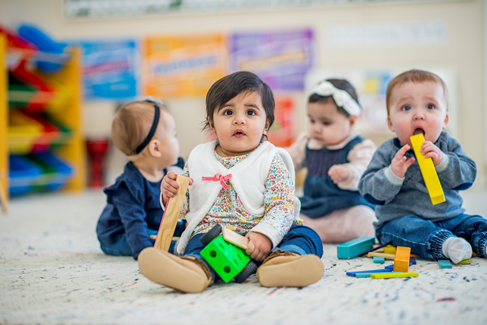Inclusive child care accommodates children with and without disabilities while treating them as equals
Inclusion is important in all areas of society, but particularly so in child care. Encouraging an environment where all are welcomed and treated equally while inherent differences are acknowledged and accommodated, is a benefit not only to the child being accepted, but also to their peers, caregivers, parents, and community.
Inclusive child care means that every child is accepted and that their individual abilities are considered and valued, which is a standard of high-quality child care in general. Inclusive child care is unique because all children can attend and participate in the same activities whether they have disabilities or not, with special instruction and support provided as needed.
Benefits of inclusion
Inclusion encourages a sense of belonging, raises the confidence of students with disabilities, and increases empathy and understanding among their peers.
Children who learn in inclusive environments develop:
- A sense of community and equality
- Experience involving diversity
- A wider variety of friends and social interactions
- Increased sensitivity towards others
- Positive self-esteem and self-concept
- Problem-solving and coping skills
Families whose children participate in an inclusive environment:
- Expand their social circle to include more variety
- Receive quality child care that honors diversity
- Have an increased understanding and awareness of others
- Develop connections to a variety of families and resources
Child care professionals working in inclusive educational programs:
- Add depth to their teaching experience
- Increase their ability to personalize activities
- Take pride that they’re preparing students for the future in a variety of ways
- Learn more about community and educational resources
- Familiarize themselves with a wide range of personalities
Increase inclusivity
If you’re committed to providing high-quality child care, you’re probably already incorporating a lot of inclusive practices in your everyday routine. Focus on the following:
- Make sure your program welcomes all cultures and abilities
- Check your policies and procedures to ensure that they are open and inclusive
- Make necessary changes in your environment or program to accommodate everyone
- Use language that puts people before their diagnosis or person-first language
- Provide adequate staffing ratios and group sizes
- Choose materials that highlight the diversity
- Respond honestly to questions children ask
- Encourage acceptance of differences
- Create an inclusion policy and parent letter regarding inclusion practices; click here for a sample of both documents
Creating an inclusive environment is good for everyone involved – there is a demand for high-quality child care that can meet the needs of all children, and the opportunity to become familiar and friendly with a diverse group of individuals is beneficial not only to children but to people in general. Commit to learning about providing specialized instruction that treats everyone as equal while honoring their differences.
The VA Infant & Toddler Network helps improve the quality of care for infants and toddlers through extensive resources, services, and education for caregivers. Learn more about how we can help you improve the standard of care.




